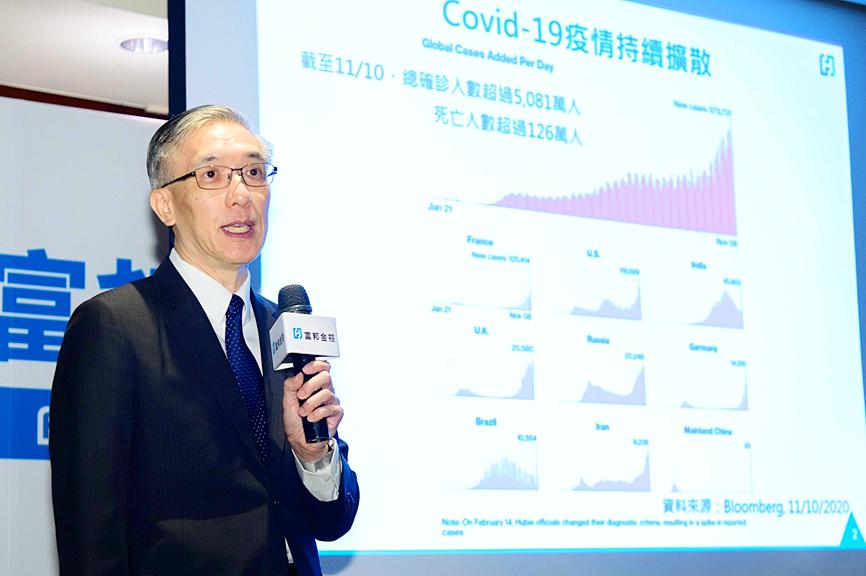Taiwan’s economy is likely to expand 3.5 to 4 percent next year, Fubon Financial Holding Co (富邦金控) said yesterday, adding that the situation would depend on the effectiveness of COVID-19 vaccines and their delivery worldwide.
Fubon Financial’s base-case scenario assumes that an effective COVID-19 vaccine would be developed by the end of June next year, but would not be distributed around the globe due to allocation issues or would be rejected by US citizens, chief economist Rick Lo (羅瑋) told an economic forum in Taipei.
In that case, the COVID-19 pandemic would be unlikely to slow down, since there would be no herd immunity as people would not get vaccinated, Lo said.

Photo courtesy of Fubon Financial Holding Co
Taiwan’s GDP growth, which is forecast to grow at least 2 percent year-on-year this year, would continue growing next year, with an expected gain of 3.5 percent in the base-case scenario, as the spread of the novel coronavirus has been curbed domestically and local technology firms are to benefit with more companies digitalizing their businesses, he said.
China’s economy is likely to register an annual increase of 7.8 percent, followed by annual rises of 5 percent in Europe, 3.7 percent in the US and 2.3 percent in Japan, Lo said.
A more positive scenario assumes that a viable vaccine would be developed by the end of the second quarter of next year and distributed worldwide by the end of the third quarter, which would raise US economic growth to 4.5 percent, with other countries benefiting as well, he said.
Taiwan’s economy would also benefit from improvement abroad and would likely report an annual gain of 4 percent, Lo said.
“Given that the Directorate-General of Budget, Accounting and Statistics on Friday predicted an annual rise of 3.83 percent for Taiwan’s economy next year, I think the agency’s optimism might fall between our two scenarios,” Lo said.
The worst-case scenario — to which Lo gave a 10 percent likelihood of materializing, compared with the base-case scenario’s 50 percent and the second scenario’s 40 percent — would be coronavirus infections continuing to rise next year, despite the development of a vaccine, and Taiwan’s economy growing 2.4 percent annually, he said.
The central bank would keep its benchmark rates unchanged next year in all three scenarios, and US-China trade tensions would stabilize, as it would not be US president-elect Joe Biden’s priority to have trade talks with China, he said.

MULTIFACETED: A task force has analyzed possible scenarios and created responses to assist domestic industries in dealing with US tariffs, the economics minister said The Executive Yuan is tomorrow to announce countermeasures to US President Donald Trump’s planned reciprocal tariffs, although the details of the plan would not be made public until Monday next week, Minister of Economic Affairs J.W. Kuo (郭智輝) said yesterday. The Cabinet established an economic and trade task force in November last year to deal with US trade and tariff related issues, Kuo told reporters outside the legislature in Taipei. The task force has been analyzing and evaluating all kinds of scenarios to identify suitable responses and determine how best to assist domestic industries in managing the effects of Trump’s tariffs, he

TIGHT-LIPPED: UMC said it had no merger plans at the moment, after Nikkei Asia reported that the firm and GlobalFoundries were considering restarting merger talks United Microelectronics Corp (UMC, 聯電), the world’s No. 4 contract chipmaker, yesterday launched a new US$5 billion 12-inch chip factory in Singapore as part of its latest effort to diversify its manufacturing footprint amid growing geopolitical risks. The new factory, adjacent to UMC’s existing Singapore fab in the Pasir Res Wafer Fab Park, is scheduled to enter volume production next year, utilizing mature 22-nanometer and 28-nanometer process technologies, UMC said in a statement. The company plans to invest US$5 billion during the first phase of the new fab, which would have an installed capacity of 30,000 12-inch wafers per month, it said. The

Taiwan’s official purchasing managers’ index (PMI) last month rose 0.2 percentage points to 54.2, in a second consecutive month of expansion, thanks to front-loading demand intended to avoid potential US tariff hikes, the Chung-Hua Institution for Economic Research (CIER, 中華經濟研究院) said yesterday. While short-term demand appeared robust, uncertainties rose due to US President Donald Trump’s unpredictable trade policy, CIER president Lien Hsien-ming (連賢明) told a news conference in Taipei. Taiwan’s economy this year would be characterized by high-level fluctuations and the volatility would be wilder than most expect, Lien said Demand for electronics, particularly semiconductors, continues to benefit from US technology giants’ effort

‘SWASTICAR’: Tesla CEO Elon Musk’s close association with Donald Trump has prompted opponents to brand him a ‘Nazi’ and resulted in a dramatic drop in sales Demonstrators descended on Tesla Inc dealerships across the US, and in Europe and Canada on Saturday to protest company chief Elon Musk, who has amassed extraordinary power as a top adviser to US President Donald Trump. Waving signs with messages such as “Musk is stealing our money” and “Reclaim our country,” the protests largely took place peacefully following fiery episodes of vandalism on Tesla vehicles, dealerships and other facilities in recent weeks that US officials have denounced as terrorism. Hundreds rallied on Saturday outside the Tesla dealership in Manhattan. Some blasted Musk, the world’s richest man, while others demanded the shuttering of his